If you’re dealing with acne, you’re not alone. Millions in the U.S. face this issue, which can be tough and embarrassing. But, there are solutions that can clear your skin fast.
This guide will show you the causes of acne and how to find the right skincare for you. It covers everything from hormonal breakouts to blackheads. You’ll learn about treatments, from over-the-counter options to natural remedies and professional help.
Key Takeaways
- Discover the underlying causes of acne, including hormonal imbalances and clogged pores
- Learn how to identify your acne type and develop an effective skincare routine
- Explore the role of diet and lifestyle changes in managing acne
- Understand the benefits of over-the-counter and professional acne treatments
- Discover natural remedies and strategies for preventing acne scars
By the end of this article, you’ll know how to manage your acne and get clear skin. Let’s start your journey to a clear complexion!
Understanding the Causes of Acne
Acne is a common skin issue that affects people of all ages. It’s important to know what causes it for effective treatment. Hormonal changes and clogged pores are the main reasons for acne.
Hormonal Imbalances
Changes in hormone levels, especially androgen hormones, can cause more sebum production and breakouts. This happens a lot during puberty, adolescence, and times of hormonal shifts. The body makes too much oil, which blocks pores and lets acne-causing bacteria grow.
Clogged Pores and Bacteria
Dead skin cells, dirt, and oil can also block pores, making them perfect for acne-causing bacteria. These bacteria, like Propionibacterium acnes, eat the excess oil and dead skin. This leads to pimples, blackheads, and other skin problems.
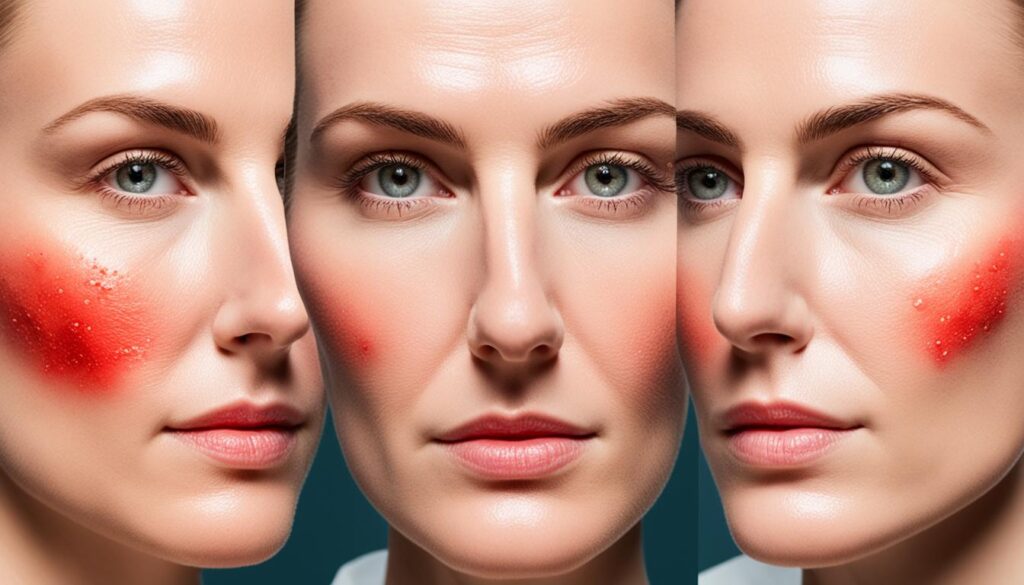
“Acne is a complex skin condition that arises from a combination of factors, including hormonal fluctuations and clogged pores.”
Knowing what causes acne helps in creating a good skincare routine. By dealing with hormonal imbalances and keeping pores clear, people can work towards clear, healthy skin.
Identifying Your Acne Type
Acne is a common skin issue that comes in many forms. Each type needs its own treatment plan. Knowing what kind of acne you have is key to finding the right skincare routine. Let’s look at the main types of acne and how to spot yours.
Cystic Acne
Cystic acne is known for its deep, painful spots under the skin. These big, red bumps are often caused by hormonal changes or blocked pores. People with cystic acne might need strong medicines or professional help to get rid of it.
Comedonal Acne
Comedonal acne shows up as blackheads and whiteheads on the skin. These spots don’t get red and swell up. They happen when oil, dead skin, and bacteria block the pores. Cleaning your skin well and removing dead skin can help clear comedonal acne.
Inflammatory Acne
Inflammatory acne has red, swollen spots like pimples and pustules. It can be caused by hormonal changes, bacteria, or skin irritation. Using products that reduce swelling can help with inflammatory acne.
Hormonal Acne
Hormonal acne is common in adults, especially women, during certain times like puberty, pregnancy, or menopause. It’s caused by hormonal imbalances that make more oil and block pores. Fixing these hormonal issues is key to treating hormonal acne.
Knowing the type of acne you have helps you pick the right skincare and treatments. This way, you can target the cause of your breakouts better. It makes getting clear, healthy skin easier.
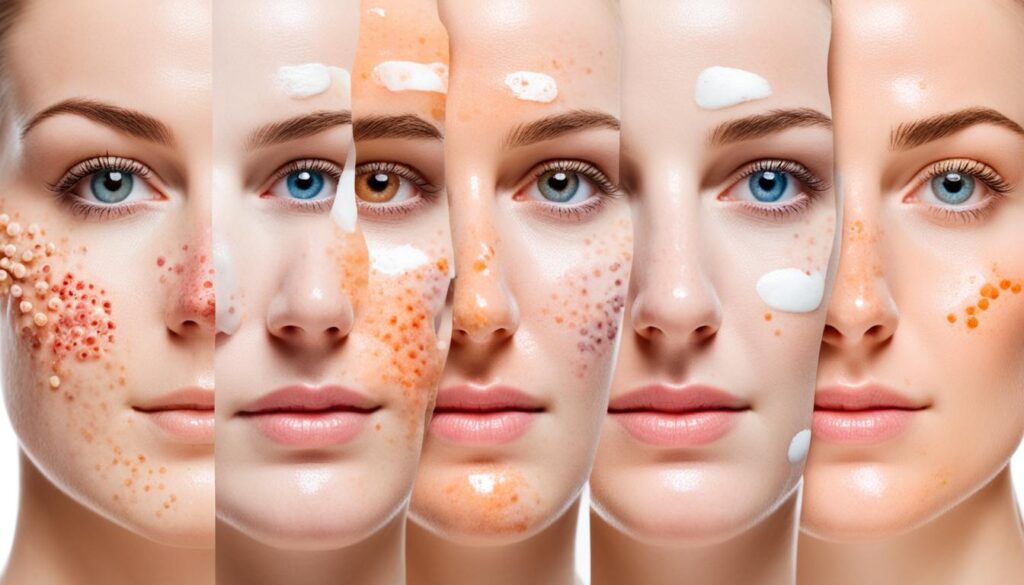
Developing an Effective Skincare Routine
Creating a targeted acne skincare routine is key to fighting breakouts. It’s important to clean and exfoliate your skin well. This removes oil, dead skin, and bacteria. It makes your skin ready for acne-fighting topicals.
Cleansing and Exfoliating
Begin your acne skincare routine with a gentle cleanser. It should unclog pores and remove dirt without drying out your skin. Then, use a weekly exfoliator for acne to get rid of dead skin. This helps your routine work better.
Topical Treatments
Adding acne-fighting topicals like benzoyl peroxide, salicylic acid, and retinoids to your routine can help a lot. These products reduce inflammation, clear pores, and stop bacteria that cause acne. Start with small amounts and increase as needed.
With a good acne skincare routine that includes cleaning, exfoliating, and specific treatments, you can work towards clear, healthy skin.
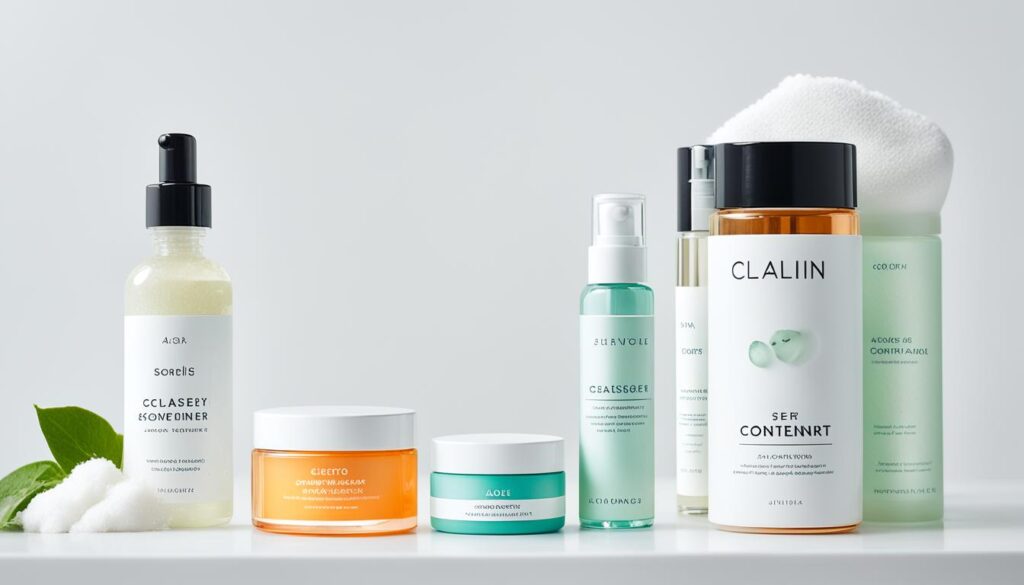
The Role of Diet in Acne Management
Research shows a strong link between diet and acne. Some foods make breakouts worse, while others can help fight acne. By knowing which foods affect skin health, we can manage acne better and get clearer skin.
Foods to Avoid
Refined carbs like white bread and sugary snacks can cause insulin spikes and inflammation. These can lead to acne. Dairy, especially milk and ice cream, may also increase acne risk because of the hormones they have. Fried and processed foods with unhealthy fats can make inflammation and clogged pores worse.
Acne-Fighting Nutrients
- Omega-3s: These fatty acids, found in salmon, walnuts, and flaxseeds, reduce redness and swelling from acne.
- Zinc: This mineral is key for skin cell growth and repair, making it vital for fighting acne.
- Vitamin A: Vitamin A’s active form, retinoids, clears pores and helps skin cell turnover.
- Probiotics: Foods like yogurt and fermented veggies support a healthy gut, which can reduce acne-related inflammation and hormones.
Eating these nutrients and avoiding acne-causing foods can help you get clearer, healthier skin.

Lifestyle Changes for Clear Skin
Getting clear, radiant skin is more than just about skincare and diet. Healthy lifestyle habits play a big role in fighting acne. By managing stress, sleeping well, exercising, protecting against the sun, and drinking water, you help your skin heal and look better.
Stress is a big factor in skin health. Chronic stress can mess with your body’s hormonal balance, making more oil and inflammation, which worsens acne. To fight this, try meditation, yoga, or deep breathing exercises to ease your stress.
Good sleep is key for your skin. Not sleeping well can slow down your skin’s repair and growth, making it more prone to breakouts. Try to get 7-9 hours of sleep each night to help your skin heal and refresh.
Exercise is great for your health and skin. It helps balance hormones, boosts blood flow, and lowers inflammation, all good for your skin’s health. Mix up your workouts with cardio, strength training, and flexibility exercises.
Protecting your skin from the sun is vital for clear skin. Too much sun can cause inflammation, dryness, and more oil production, making acne worse. Always use a broad-spectrum sunscreen with SPF 30 outside, and stay in the shade during the hottest part of the day.
Drinking enough water is crucial for your skin. Hydration keeps your skin’s barrier strong, preventing clogged pores and breakouts. Drink at least 8 cups of water a day, and eat foods that are both hydrating and full of nutrients.

By focusing on these lifestyle changes, you can work towards clear, healthy skin from the inside out. Remember, making these changes for the long term is usually better than quick fixes for acne.
Acne Solutions: Clear Skin, Acne Treatment, Skincare, Blemish Control
Are you tired of dealing with acne? Don’t worry, there are many effective solutions out there to help you get clear, glowing skin. Whether you’re fighting hormonal breakouts, stubborn blackheads, or annoying blemishes, this guide will give you the tools and knowledge you need to beat your skin issues.
Let’s explore the world of acne solutions. We’ll look at various clear skin remedies, pimple treatments, and blemish control products that can change your skin for the better. From products you can buy over-the-counter to professional dermatologist-approved solutions, we’ve got everything covered.
Natural Acne Cures
If you prefer a natural approach, there are many natural acne cures and spot reduction techniques to try. Add acne-fighting ingredients like tea tree oil, salicylic acid, and benzoyl peroxide to your daily skincare routine. These can help with blackhead removers and better skin health.
| Ingredient | Benefits |
|---|---|
| Tea Tree Oil | Possesses antimicrobial properties to combat acne-causing bacteria |
| Salicylic Acid | Exfoliates and unclogs pores, reducing the appearance of blemishes |
| Benzoyl Peroxide | Effectively kills acne-causing bacteria and dries out pimples |
For clear, blemish-free skin, it’s important to choose acne solutions that fit your skin type and concerns. Talk to a dermatologist or a skin care expert to find the best clear skin remedies for you.
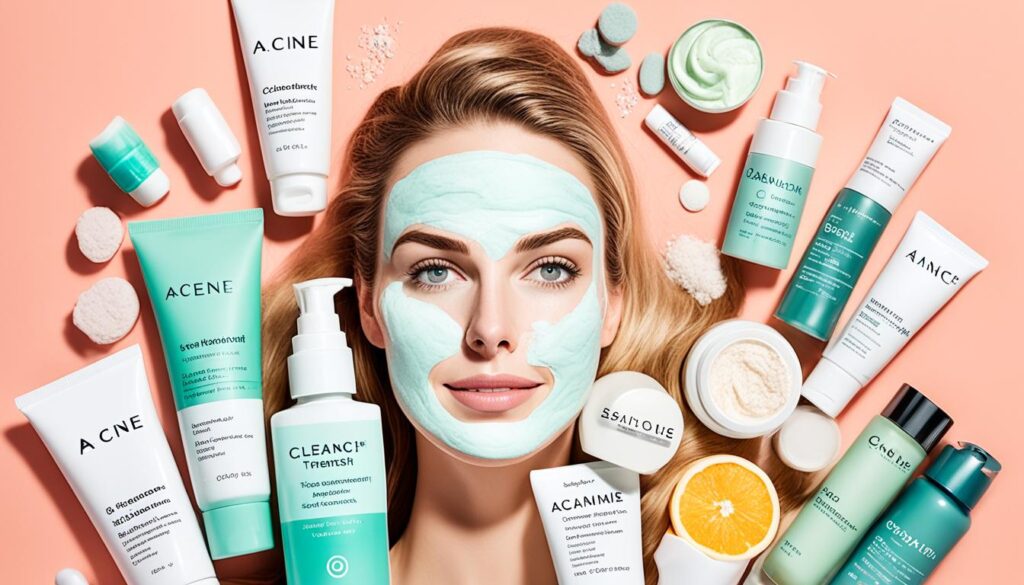
“The secret to flawless skin lies in finding the right pimple treatments and blemish control products for your individual needs.”
Over-the-Counter Acne Medications
For those with mild to moderate acne, over-the-counter (OTC) medications are a good choice. They are easy to find and won’t break the bank. These products often have benzoyl peroxide and salicylic acid. These ingredients help reduce inflammation, kill bacteria, and clear pores.
Using OTC acne medications as directed can help manage breakouts and stop new ones from happening.
Benzoyl Peroxide
Benzoyl peroxide is a common OTC acne treatment. It fights over-the-counter acne medications by killing bacteria on the skin. You can find it in washes, creams, and gels, with strengths from 2.5% to 10%.
This ingredient dries out pimples and helps them heal. That’s why it’s a top pick for fighting acne-fighting ingredients.
Salicylic Acid
Salicylic acid is another key ingredient in OTC acne treatments. It cleans the skin and opens up clogged pores. This helps remove dead skin and too much oil, stopping over-the-counter acne medications from working.
You can find salicylic acid in cleansers, toners, and spot treatments.
When using benzoyl peroxide or salicylic acid, start with a low concentration. Increase it as your skin can handle it. Using too much can cause dryness and irritation.
Knowing how over-the-counter acne medications work can help you pick the right one for your skin. This way, you can find the best OTC treatment for your skin’s needs.
Professional Acne Treatments
For those with stubborn or severe acne, professional treatments by a dermatologist might be the answer. These treatments can tackle the deep causes of acne and make blemishes and scars less noticeable.
Prescription Medications
Prescription acne meds, like isotretinoin and certain antibiotics, can control sebum, lessen inflammation, and target acne at its source. Isotretinoin is especially good at treating severe acne by lowering the skin’s oil production.
Dermatological Procedures
Dermatologists may suggest advanced treatments for acne and scars. Chemical peels can remove dead skin and hide blemishes. Laser treatments can fade acne scars.
| Professional Acne Treatment | Description | Benefits |
|---|---|---|
| Isotretinoin | Prescription medication that reduces sebum production and targets the root causes of acne | Highly effective in treating severe, cystic acne |
| Antibiotics | Prescription medications that help reduce inflammation and kill acne-causing bacteria | Can be used in combination with other treatments for comprehensive acne management |
| Chemical Peels | Exfoliating treatment that removes the outermost layer of skin to minimize the appearance of blemishes | Improves the skin’s texture and tone, reducing the visibility of acne scars |
| Laser Treatments | Advanced dermatological procedures that use targeted light energy to reduce the appearance of acne scars | Effectively diminishes the look of acne scarring and improves skin’s overall appearance |
Working with a dermatologist, people with tough or severe acne can find these professional treatments. They can create a plan for clearer, healthier skin.
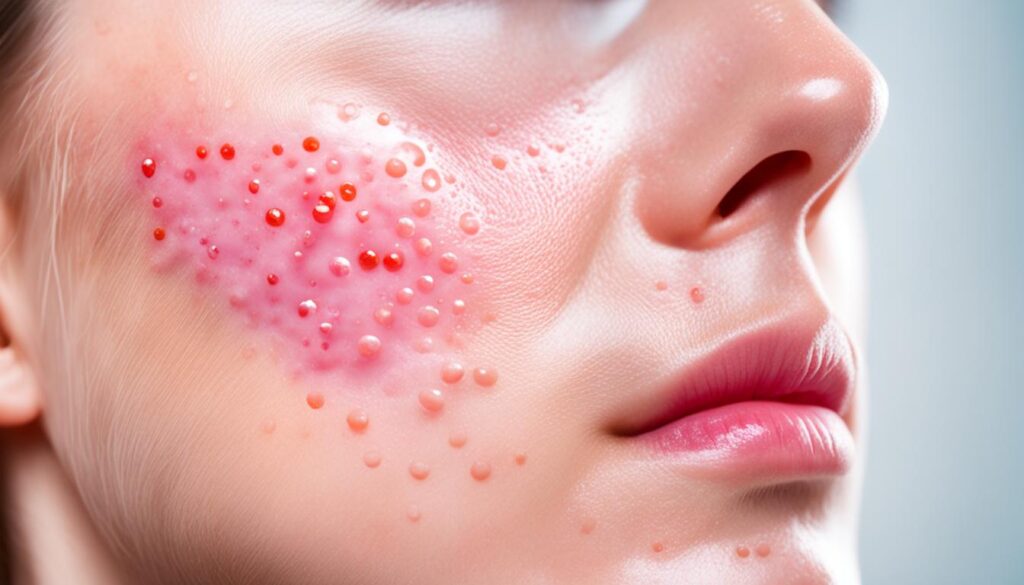
Natural Remedies for Acne
If you’re looking for a natural way to fight acne, you’re in luck. There are many home remedies and natural ingredients that can help. Tea tree oil, witch hazel, green tea, honey, and apple cider vinegar are great options. They are known for their anti-inflammatory and antibacterial properties.
Tea tree oil is a top choice for acne. It fights bacteria and reduces inflammation. You can use it directly on your skin or find products with it.
Witch hazel is another popular remedy. It has been around for ages to clean and soothe the skin. Use it as a toner or on specific spots.
- Green tea is full of antioxidants and helps with acne. You can use a green tea moisturizer or cool green tea bags on your skin.
- Honey is great for acne because it keeps the skin moist and fights bacteria. Make a honey face mask a few times a week.
- Apple cider vinegar balances the skin’s pH and reduces inflammation. Mix it with water as a toner or add it to your face wash.
Using these natural remedies can help you fight acne without harsh chemicals. Always test new ingredients on a small area first. If you have severe acne, talk to a dermatologist. With some trial and error, you can find what works best for you.

“In my experience, natural remedies can be just as effective as over-the-counter or prescription treatments, if not more so. You just have to be patient and consistent with their use.”
Preventing Acne Scars
Dealing with acne can be tough, but the scars that come after can be harder. Luckily, there are ways to stop acne scars before they form and make them less noticeable.
First, treat pimples right away and don’t pick or pop them. This helps prevent scars by letting your skin heal right. Also, using over-the-counter scar treatments with retinoids and vitamin C can help fade scars.
For tough scars, you might need professional scar treatments. Things like microneedling and laser resurfacing work well. They help by making more collagen and smoothing the skin.
- Treat blemishes promptly to prevent scarring
- Avoid picking or popping pimples
- Use over-the-counter scar treatments with retinoids and vitamin C
- Consider professional treatments like microneedling and laser resurfacing for more severe scarring
| Treatment | Description | Effectiveness |
|---|---|---|
| Microneedling | A minimally invasive procedure that uses fine needles to create micro-injuries in the skin, stimulating collagen production and smoothing the skin’s surface. | Highly effective for improving the appearance of acne scars. |
| Laser Resurfacing | A procedure that uses laser energy to remove the outer layer of the skin, revealing smoother, healthier-looking skin underneath. | Highly effective for reducing the appearance of acne scars, but may require multiple treatments. |
By acting early to prevent and manage acne scarring, you can feel confident in your skin again. You’ll have a clear, healthy look.
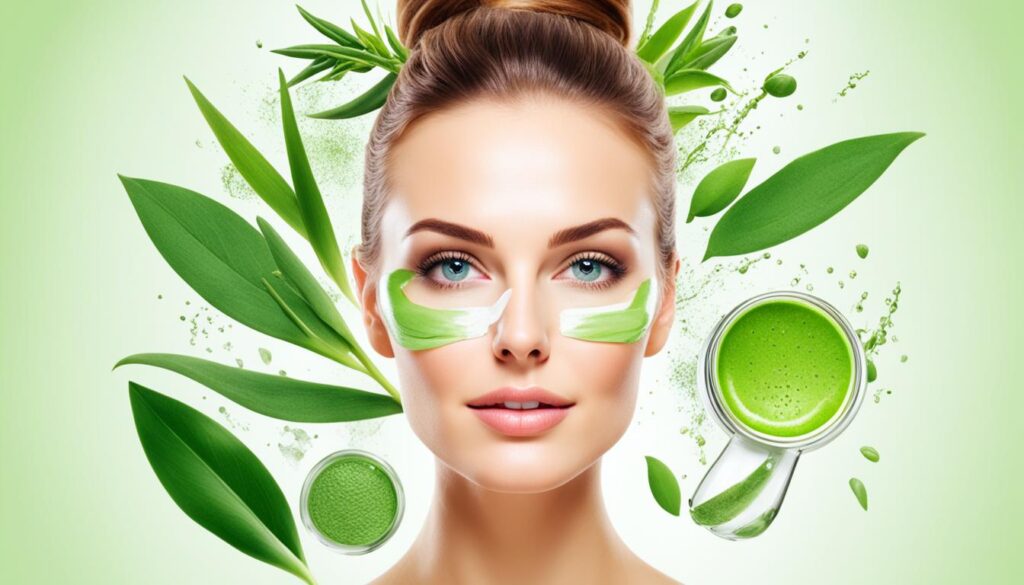
Dealing with Emotional Impacts
Acne can deeply affect a person’s emotional health. It often makes people feel self-conscious and lowers their self-esteem. It can even lead to depression. It’s important to recognize and deal with the emotional effects of acne on mental health.
Boosting Self-Confidence
Self-care is a strong way to fight the emotional side of acne. It helps build resilience and boosts self-confidence. This includes mindfulness, regular exercise, and getting support from loved ones or mental health experts.
Instead of just focusing on acne, highlighting one’s strengths and positive qualities can help. Being around supportive people and doing things that make you happy also helps. This can improve self-confidence and emotional well-being.
“Acne is not just a skin condition; it can have a profound impact on one’s mental health and self-esteem. By addressing the emotional impacts, individuals can learn to cope with acne and reclaim their self-confidence.”
Getting help from professionals, like therapists or counselors, is also key. They offer strategies and support for dealing with acne’s emotional side. This can make it easier to handle the psychological challenges of acne.
By tackling the emotional side of acne with self-care and self-confidence, people can manage their skin condition better. This approach improves overall well-being.
Seeking Professional Help
If your acne is severe, doesn’t go away, or doesn’t improve with over-the-counter treatments, it’s time to see a dermatologist. These experts can figure out the type and severity of your acne. They can also create a treatment plan just for you and suggest stronger medicines or special treatments if needed.
An acne consultation with a dermatologist is very helpful. They will look at your skin closely, find out why you have acne, and suggest dermatologist-recommended treatments that fit your skin’s needs. They might recommend prescription creams or pills to help with your acne diagnosis.
Don’t wait for your acne to get worse or leave scars. Get professional help right away if you keep getting breakouts that don’t go away with over-the-counter products. A personalized treatment plan from a dermatologist can help you get the clear, healthy skin you want.
“A dermatologist can be your greatest ally in the fight against acne. They have the expertise to identify the root causes and develop a targeted treatment plan to get your skin back on track.”
Remember, it’s always best to be safe when deciding when to see a dermatologist. Don’t wait to make an appointment if you’re dealing with tough acne. With the right professional advice, you can find the acne solutions you’ve been looking for.
Conclusion
In this guide, we’ve looked at many ways to fight acne and get clear skin. We’ve covered everything from the causes of acne to how to make a skincare routine and change your lifestyle. Now, you know how to take care of your skin and fight acne.
By finding out what causes acne and using the right skincare, you can beat acne and keep your skin clear. Remember, everyone is different, so what works for one might not work for another. Keep trying different things until you find what’s best for you.
We’ve talked about many ways to fight acne, from over-the-counter products to natural remedies and changing your lifestyle. I hope this guide has given you the confidence to take charge of your skin. With the right approach, you can say goodbye to acne and hello to clear, glowing skin.

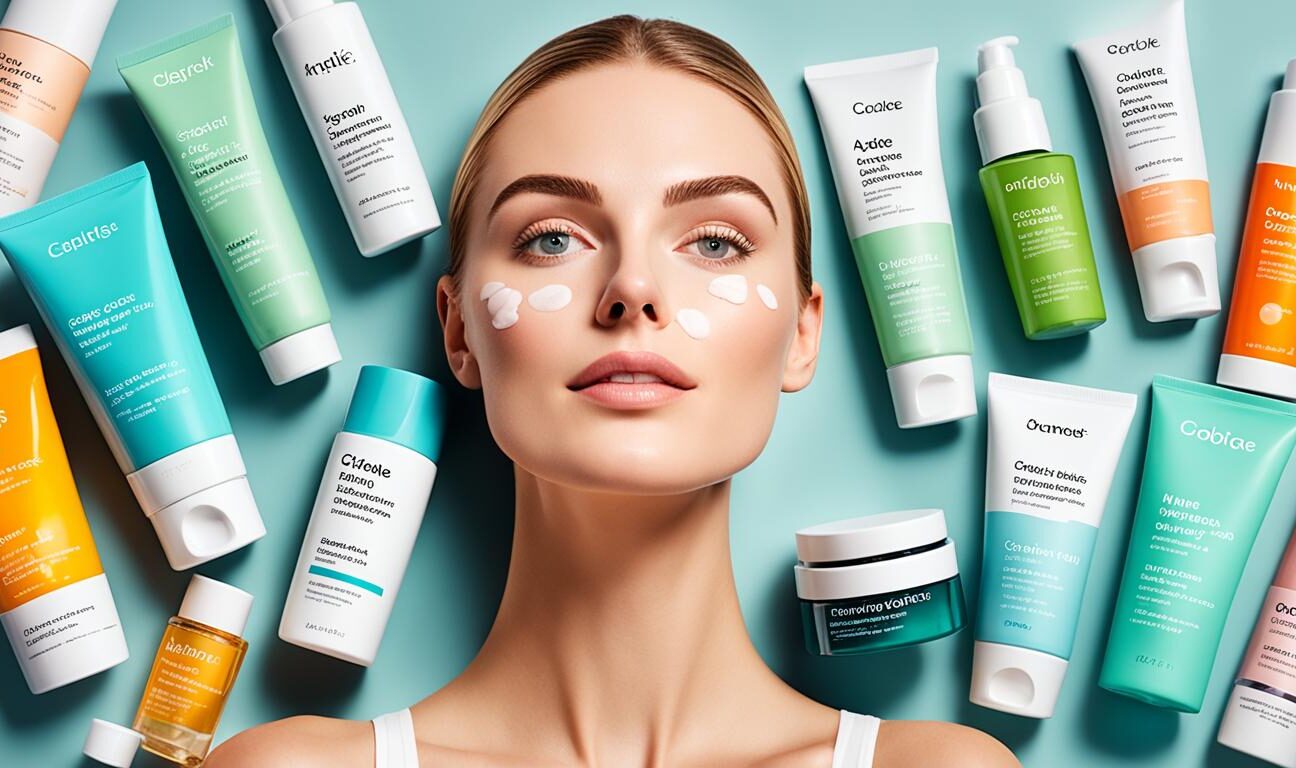

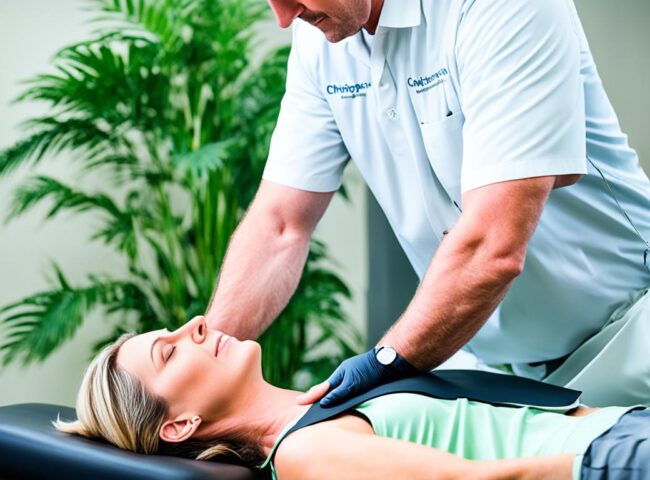


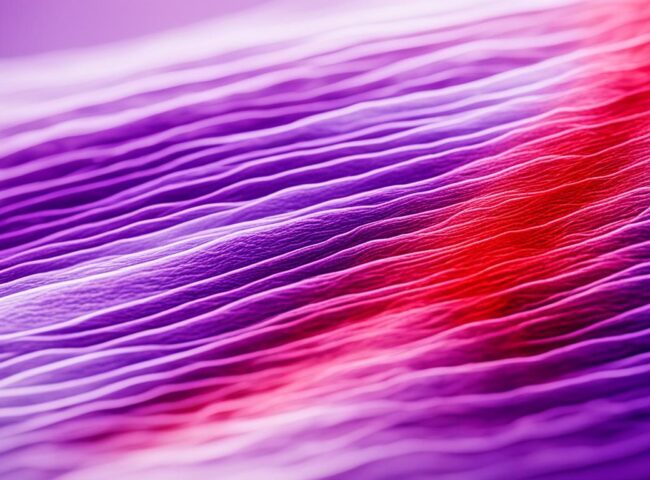
Leave feedback about this